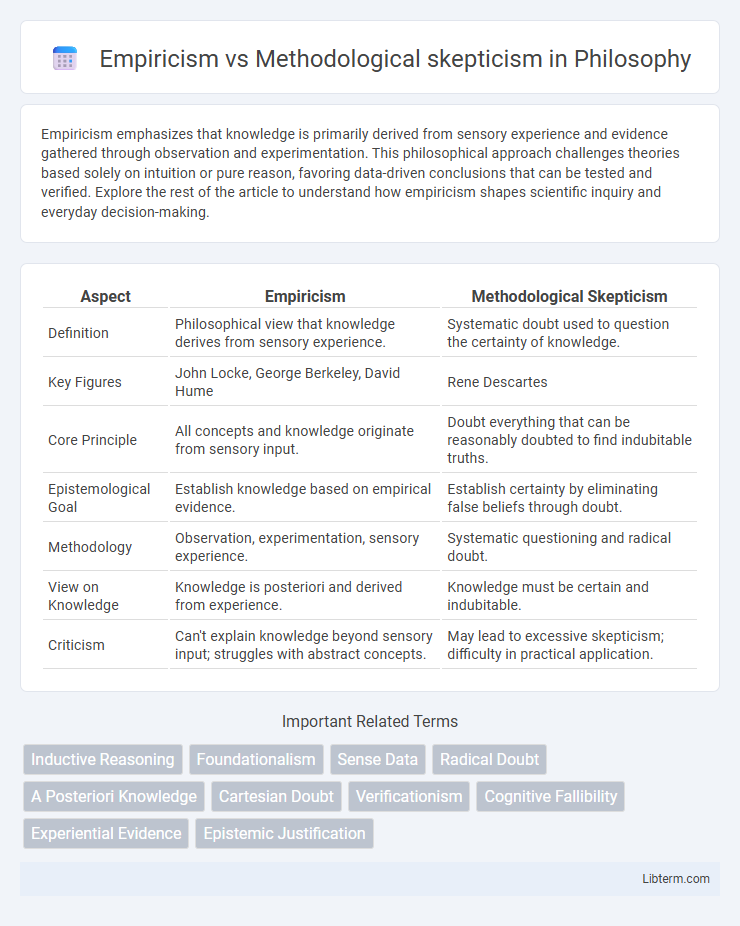Empiricism emphasizes that knowledge is primarily derived from sensory experience and evidence gathered through observation and experimentation. This philosophical approach challenges theories based solely on intuition or pure reason, favoring data-driven conclusions that can be tested and verified. Explore the rest of the article to understand how empiricism shapes scientific inquiry and everyday decision-making.
Table of Comparison
| Aspect | Empiricism | Methodological Skepticism |
|---|---|---|
| Definition | Philosophical view that knowledge derives from sensory experience. | Systematic doubt used to question the certainty of knowledge. |
| Key Figures | John Locke, George Berkeley, David Hume | Rene Descartes |
| Core Principle | All concepts and knowledge originate from sensory input. | Doubt everything that can be reasonably doubted to find indubitable truths. |
| Epistemological Goal | Establish knowledge based on empirical evidence. | Establish certainty by eliminating false beliefs through doubt. |
| Methodology | Observation, experimentation, sensory experience. | Systematic questioning and radical doubt. |
| View on Knowledge | Knowledge is posteriori and derived from experience. | Knowledge must be certain and indubitable. |
| Criticism | Can't explain knowledge beyond sensory input; struggles with abstract concepts. | May lead to excessive skepticism; difficulty in practical application. |
Introduction to Empiricism and Methodological Skepticism
Empiricism emphasizes knowledge derived from sensory experience and observation as the foundation of understanding reality. Methodological skepticism involves systematically doubting beliefs to eliminate doubt and achieve certainty, often associated with the Cartesian method. Both approaches critically contribute to epistemology by addressing the sources and validation of human knowledge through experience and doubt.
Defining Empiricism: Core Principles
Empiricism centers on the principle that knowledge primarily derives from sensory experience and observation, emphasizing evidence gathered through the five senses as the foundation for understanding reality. This philosophical approach asserts that all concepts and ideas must be traceable to direct or indirect sensory data, rejecting innate ideas or knowledge independent of experience. Empiricism contrasts sharply with methodological skepticism, which systematically doubts all knowledge claims to establish certainty through rigorous questioning rather than sensory evidence.
Exploring Methodological Skepticism: Key Concepts
Methodological skepticism emphasizes systematic doubt, rigorously questioning all beliefs to establish certain knowledge, contrasting with empiricism's reliance on sensory experience for truth. Central to methodological skepticism are concepts like Cartesian doubt, where foundational beliefs are stripped to avoid deception, and the pursuit of indubitable truths through critical inquiry. This approach prioritizes reason and logical analysis over empirical evidence to build a secure epistemic foundation.
Historical Origins and Philosophical Context
Empiricism, rooted in the works of John Locke and David Hume in the 17th and 18th centuries, emphasizes knowledge acquisition through sensory experience and observation, shaping the foundation of modern scientific inquiry. Methodological skepticism, notably advanced by Rene Descartes in the 17th century, advocates systematic doubt as a means to achieve certain knowledge by questioning all beliefs until indubitable truths emerge. These philosophical approaches arose during the early modern period, reflecting divergent strategies to address epistemological uncertainty amid the rise of scientific revolution and enlightenment thinking.
Major Proponents and Influential Works
Empiricism, championed by John Locke with his seminal work "An Essay Concerning Human Understanding," emphasizes knowledge derived from sensory experience, while David Hume advanced this philosophy by scrutinizing human perception and causality. Methodological skepticism, predominantly associated with Rene Descartes, is articulated in "Meditations on First Philosophy," where he systematically doubts all knowledge to establish certainty through reason. Both philosophies have profoundly influenced epistemology, shaping modern inquiries into the sources and limits of human knowledge.
Methodological Approaches: Empirical Observation vs Skeptical Inquiry
Empiricism relies on empirical observation as the primary method for acquiring knowledge, emphasizing sensory experience and experimental evidence to validate claims. Methodological skepticism, in contrast, employs skeptical inquiry to systematically doubt and scrutinize beliefs, suspending judgment until certainty is achieved. The methodological approach of empiricism prioritizes data derived from observation, while methodological skepticism challenges this data through rigorous questioning to eliminate falsehoods.
Implications for Scientific Investigation
Empiricism emphasizes observation and sensory experience as the foundation for scientific knowledge, ensuring that hypotheses are tested through measurable evidence and reproducible experiments. Methodological skepticism, by systematically doubting assumptions and seeking certainty, promotes rigorous critical analysis and helps identify biases or errors in scientific inquiry. Together, these approaches enhance the reliability and validity of scientific investigation by balancing empirical data collection with continuous scrutiny of underlying premises.
Critiques and Limitations of Empiricism
Empiricism faces critiques for its reliance on sensory experience, which can be subjective and prone to errors, limiting the certainty of knowledge claims. Methodological skepticism challenges empiricism by emphasizing systematic doubt and questioning the validity of sensory data before accepting any knowledge. This critique highlights empiricism's inability to provide a foundation for absolute certainty, as sensory input may be deceptive or insufficient for comprehensive understanding.
Critiques and Limitations of Methodological Skepticism
Methodological skepticism, while foundational in philosophical inquiry, faces critiques for its potential to lead to radical doubt, which can undermine the possibility of attaining certain knowledge. Empiricists argue that its reliance on systematic doubt neglects the role of sensory experience and empirical evidence essential for knowledge acquisition. Limitations include its sometimes impractical demand for absolute certainty and the risk of ignoring pragmatic ways humans construct reliable beliefs through observation and experimentation.
Comparative Analysis: Strengths and Integration in Modern Epistemology
Empiricism emphasizes knowledge acquisition through sensory experience, offering concrete, testable data that grounds scientific inquiry and practical understanding, while Methodological Skepticism employs systematic doubt to challenge assumptions and refine beliefs, enhancing critical scrutiny and intellectual rigor. Strengths of Empiricism lie in its empirical validation and adaptability to new evidence, whereas Methodological Skepticism excels in uncovering hidden biases and preventing premature conclusions. Modern epistemology integrates both by using empirical data as a foundation complemented by skeptical analysis to ensure robustness and reliability in knowledge claims.
Empiricism Infographic

 libterm.com
libterm.com